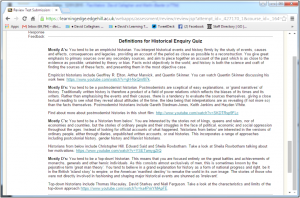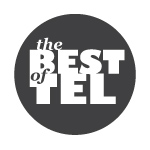Reflections on ‘What Kind of Historian are you?’ Quiz
According to Mason Norton (Edge Hill University) and Dan Taylor (University of Roehampton), in history, there are four broad categories of historian:
-
Empiricist
-
Postmodernist
-
‘historian from below’
-
‘top-down’
The categories emerged as part of the Developing Historical Thinking project run by Edge Hill and Roehampton, when Mason and Dan teamed up to create a Cosmopolitan style self-test quiz – aimed at getting first year History students to think about the theory of history. Mason wrote this post, and Dan comments: “… it’s a thoughtful reflection on a great tool and an enjoyable collaboration”.
Reflections on ‘What Kind of Historian are you?’ Quiz
by Mason Norton
 Quizzes can seem like a very basic, almost too simple, pedagogic tool, and with a topic as complex and as endless as historiography, you might be forgiven for thinking that the two would not go together very well. However, back in the summer of 2013, myself and Dan Taylor of Roehampton were given the task of thinking up a quiz to be called ‘What Kind of Historian are you?’. Whilst to me, the answer is simple, I was conscious of the fact that to many first-year undergraduates, the challenge is to get them to think about the theory of history as something other than a tedious irrelevance.
Quizzes can seem like a very basic, almost too simple, pedagogic tool, and with a topic as complex and as endless as historiography, you might be forgiven for thinking that the two would not go together very well. However, back in the summer of 2013, myself and Dan Taylor of Roehampton were given the task of thinking up a quiz to be called ‘What Kind of Historian are you?’. Whilst to me, the answer is simple, I was conscious of the fact that to many first-year undergraduates, the challenge is to get them to think about the theory of history as something other than a tedious irrelevance.
So we realised the quiz could be an opportunity to make something daunting look a little bit fun, whilst making students stop and think. After half a summer of e-mails going back and forward, we managed to get it down to four categories; empiricist, postmodernist, ‘historian from below’, and ‘top-down’. This was a simplification of some historical schools of thought, but it was a necessary one- freshers, for example, are ill-equipped to know, or even care, about debates within, say, the Marxist school of historians about the collapse of the USSR. This process was in itself quite interesting because it showed collaboration not just between the universities, but between the disciplines- I am a historian whilst Dan is a philosopher. The conversations between the two of us were mutually informative- it is useful, I think, for a historian to see what a philosopher thinks of history, and also for a philosopher to see what a historian thinks of philosophy.
Then, we had to think up of ten questions to ask. Easy? Well, no, actually. We needed to strike a balance between covering ground already encountered at A-level, and also introducing students to new areas of historical enquiry. Most freshers, for example, would probably have never thought of treating human sexuality as a subject for serious historical enquiry. So our quiz needed to be constructed as a bridge between what had already gone before- what students would, or at least should, be fairly confident about tackling- and some of what they would be looking at over the next three years.
When we launched the quiz, there was an immediate flurry of interest, which was pleasing. Then, when it came to the dissemination phase, interest expanded even further. We received an e-mail asking if we wanted to let the quiz be used on a History teaching resources site, and then we received an approach to talk about the quiz as part of Making History on BBC Radio 4, with a link to the quiz on the programme’s website, which boosted the profile of the HEA project as a whole.
Consequently, when it came to the second iteration, there followed after the quiz a series of entries on personal journals using Blackboard (which was also the software upon which the quiz ran), which meant that we could see what students made of the quiz and their answers. This further developed the interactive process between student and tutor. We observed students reflecting upon their engagement, and come the end of the semester, when we ran the quiz again, we could see how far (or not) students had come.
So the quiz, through both its construction and its iteration/implementation, proves the use of technology as a crucial part of the digital humanities, and of education as a two-way street. In the iteration, students have been introduced to some different historical schools via a practical, hands-on exercise, as opposed to say a fifty-minute lecture, followed by a two-hour seminar. We as tutors have then learned more about individual students and their preconceptions, and what we need to work on and/or develop over the next few weeks that the module will be running for- something that we would not otherwise have had necessarily until the first assessment a few weeks later. This dialogic element is what makes Blackboard such a vital learning tool, in my opinion- we can pick up on the misconceptions earlier, and without causing such a knock-on effect for student grades, or, for that matter, the confidence of individual students.
In the construction, we have been forced to look more seriously at what we had taken for granted- and in the design of this quiz, one or two of my own preconceptions have been challenged- that may well have been the same for Dan too. So this means that we too become better historians (or, in Dan’s case, a better philosopher) as a result of having to rise to a new challenge, which is, to use a cliché, all part of the learning curve.
The result is that a format that may, at first glance, seem trivial and trite, is actually- once you start to work with it in depth- quite challenging and quite stimulating- and offers a new take on what is, perhaps, an old problem.
 Mason Norton
Mason Norton
Associate Tutor
Department of English & History
[email protected]

